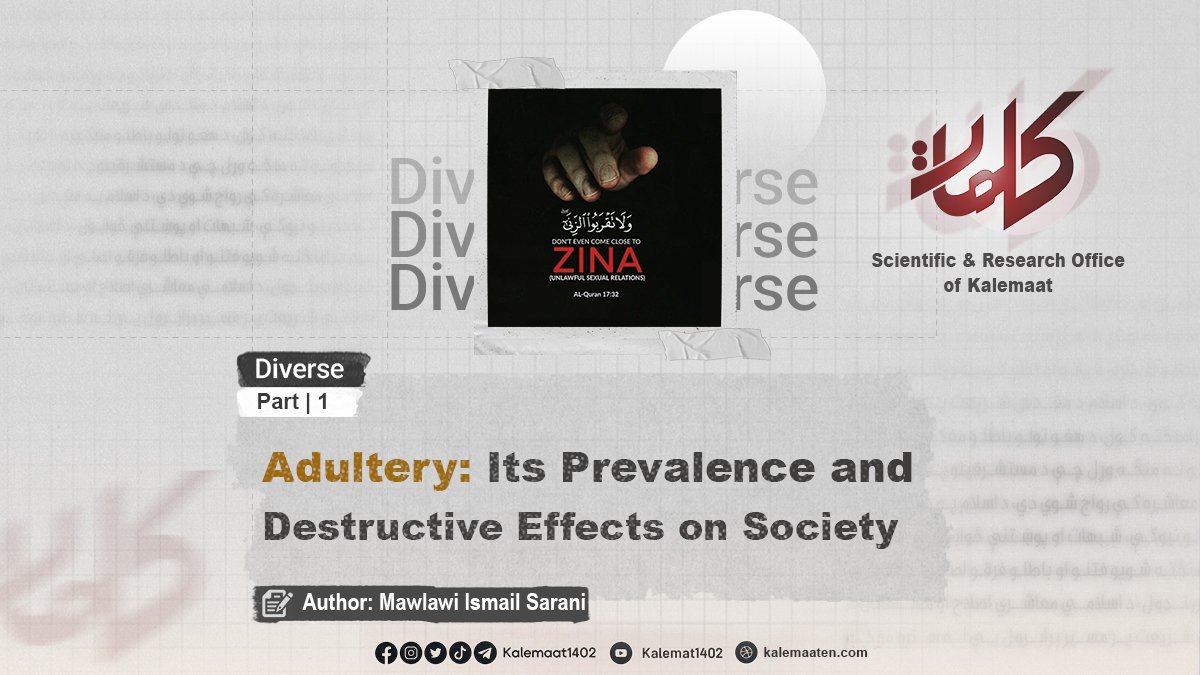
Author: Mawlawi Ismael Sarani
Adultery: Its Prevalence and Destructive Effects on Society (Part One)
Abstract:
The Qur’an, describing the eighth quality among the twelve attributes of God’s distinguished servants, states: “وَلَا یزْنُونَ وَمَنْ یفْعَلْ ذَلِكَ یلْقَ أَثَامًا” Translation: “They do not commit adultery; and whoever does so will face a severe punishment.”
This verse highlights one of the most important values of righteous and exemplary servants of God: the preservation of chastity and modesty, and a strict avoidance of any form of sexual impurity or violation of the boundaries of moral and pure living. One of the most despicable manifestations of indecency is the act of adultery or immoral sexual conduct.
It is important to understand that one of the essential pillars of a healthy society—recognized and emphasized by all prophets and wise people—is the principle of chastity and protective honor. This principle strengthens lawful and reasonable relations between people, men and women, and serves as a powerful tool to prevent many social and family corruptions, deviations, and disasters.
Adultery, being the most disgraceful form of sexual impurity, has devastating and destructive consequences. It leads to the breakdown of families, sedition, suicide, addiction, cruelty, and many major crimes. For this reason, the Qur’an not only forbids the act itself but also warns against even approaching it: “وَلَا تَقْرَبُوا الزِّنَا إِنَّهُ كَانَ فَاحِشَةً وَسَاءَ سَبِیلًا” Translation: “Do not even go near adultery—it is a shameful and evil path.”
The verse does not merely say “do not commit adultery,” but rather emphasizes avoiding anything that leads to this disgraceful act. This expression reveals that falling into adultery often results from preliminary actions that gradually draw a person toward it. Therefore, it is essential to also avoid those precursors, such as lustful glances, immodest clothing or behavior, watching seductive movies, reading corrupting books, and listening to misleading songs and music—each of which can lead to sexual deviation and moral decay.
Introduction:
We all know that every male and female of the human species, upon reaching maturity and being physically healthy, experiences a natural instinctual attraction to the opposite sex. This instinct is not limited to humans but exists among all animals.
Allah, Glorified and Exalted, has designed the physical bodies of men and women in such a way that sincere enjoyment is achieved through marital life. If we study human history, we see that the tradition of marriage and family formation has existed since early times, and there is no evidence to the contrary. Indeed, the exclusive relationship between a woman and her husband is a natural principle that forms the foundation of society. There is no doubt that even when human populations were numerous, they were ultimately organized into smaller units called families. This exclusivity led men to defend their women and protect them from the aggression of others, a protection known as ghayrah (protective jealousy). Many have considered the defense of honor so vital that they would sacrifice their lives for it.
Throughout history, marriage has been praised and considered a noble tradition, while adultery has been condemned. It has generally been viewed as a heinous, disgraceful, and socially destructive act.
The fact that all peoples and nations across all eras have considered adultery to be shameful and indecent stems from their awareness that it corrupts lineage and family trees, disrupts generational continuity, and causes the spread of various diseases. Moreover, it destroys virtues such as chastity, modesty, honor, affection, and mercy within society, replacing them with indecency, shamelessness, dishonor, hostility, and cruelty.
Despite all this, the civilization created by Europeans is based solely on indulgence and sensual pleasure. They have cast aside all religious, cultural, moral, and human codes of conduct and granted individuals complete freedom to pursue any desire, no matter how vile. The result of such a civilization has been the widespread prevalence of sexual immorality among men and women—even within families, among married men and women—and, worse, even extending to relationships with forbidden close relatives. Few people have remained untainted by the destructive effects of this so-called modern civilization.
Literal Meaning of Zina (Adultery):
Zina refers to the unlawful sexual union of a man and a woman.
General Definition of Zina:
Generally, zina is defined as: sexual intercourse outside the context of lawful marriage or mistaken belief of marriage, including even in non-vaginal forms, with a woman for whom such contact is inherently forbidden.
The Oppression of Women:
In past civilizations, women were often the targets of men’s aggression and injustice. Men, in their power, became like predatory beasts toward women. Across the world, there was an unwritten law that regarded men as inherently superior, regardless of whether the society was civilized or not, educated or uneducated. Women were treated as commodities, easily bought and sold. Men used them for their desires however they pleased—even forcing them into prostitution for financial gain. Women, besides suffering other forms of injustice, were also treated as a source of income by men.
Continues…



